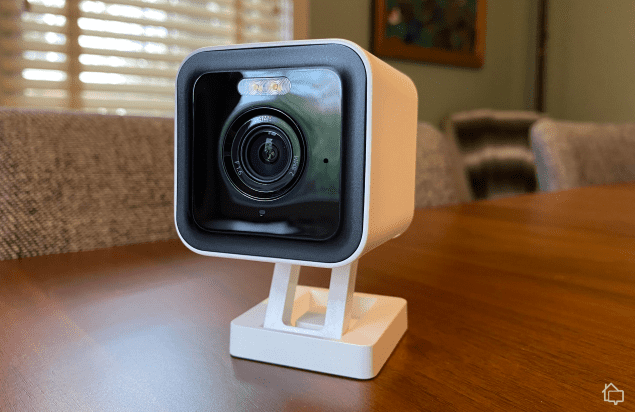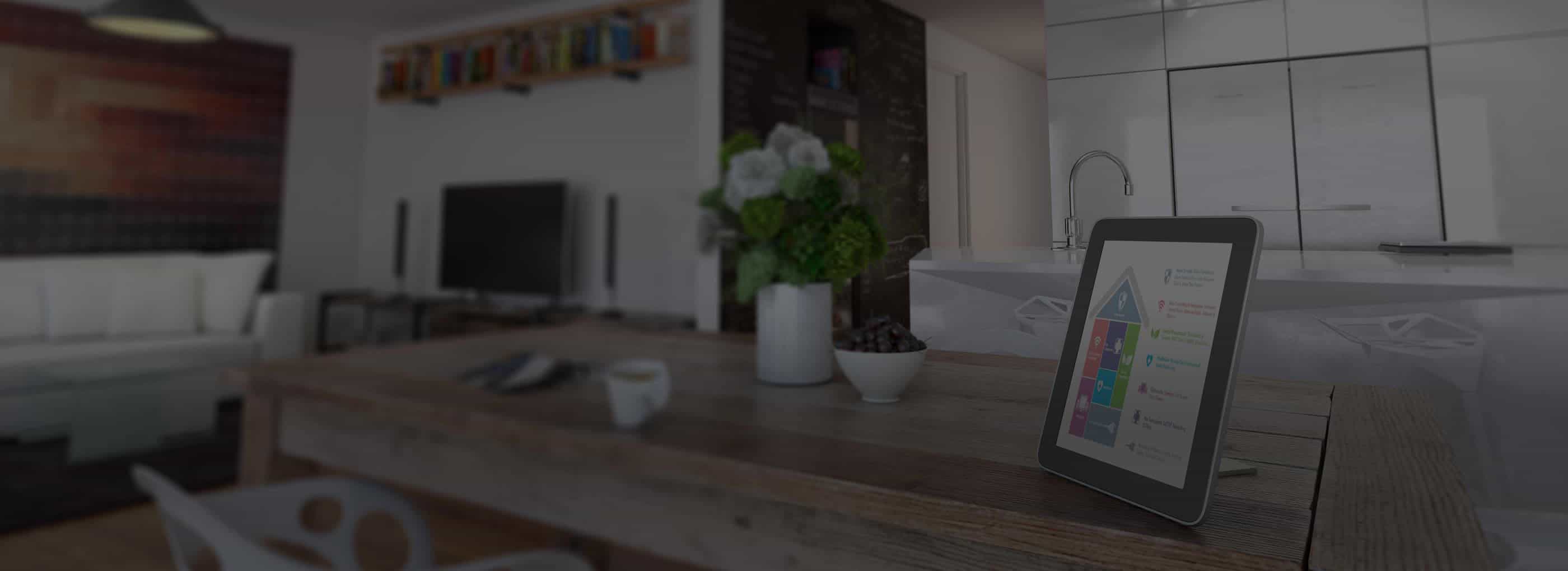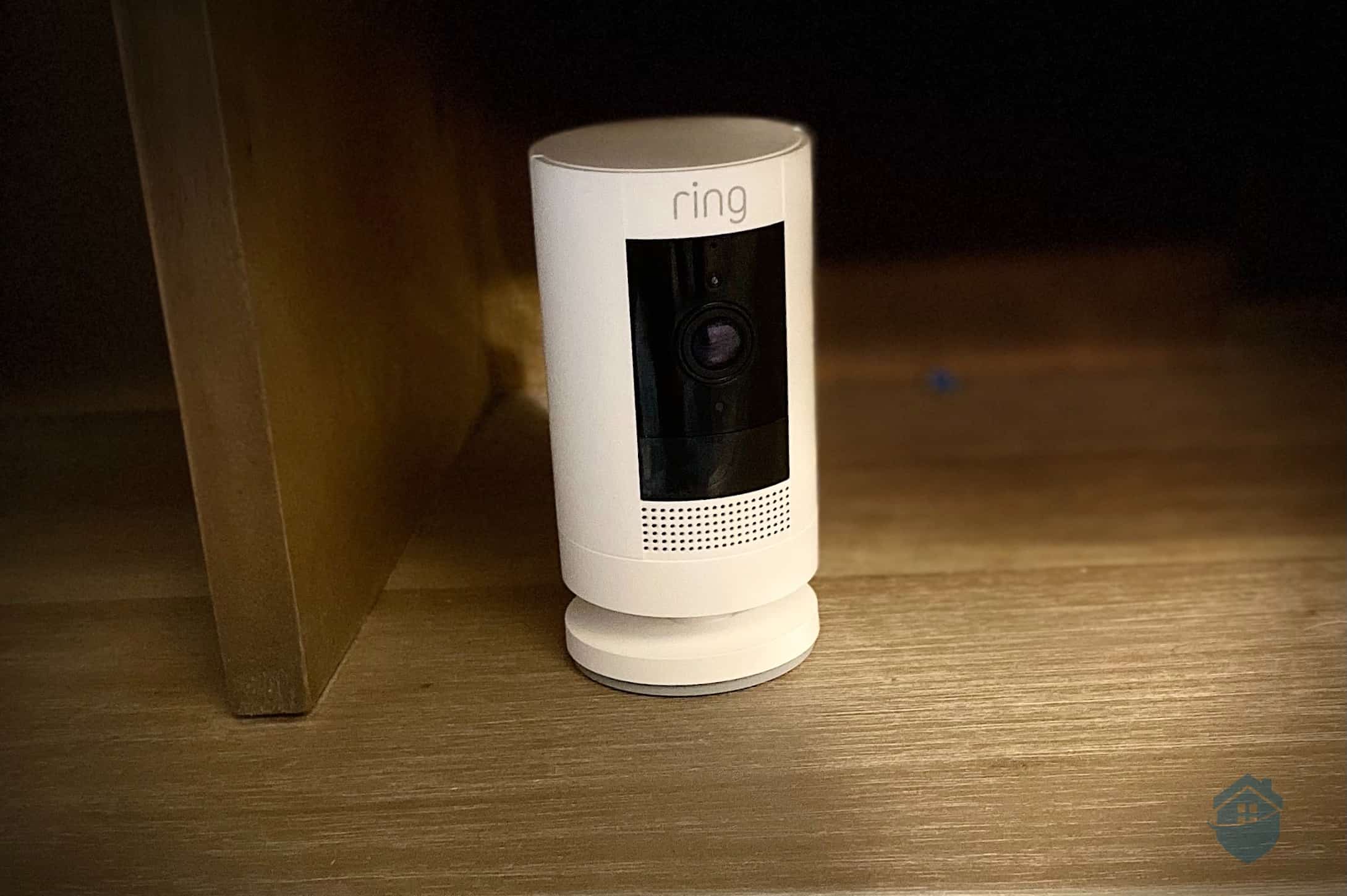When you rent your apartment or home, it can be scary to try any DIY project – let alone one that raises as many technical, social, and legal questions as security camera installation. Can you set up that camera without losing your deposit? Alienating your neighbors? Getting evicted?
As a lifelong renter, I’ve asked myself all the same things. I’ve also done the research and can tell you the answer is yes. You can almost certainly install a security camera in your rented home – even if “home” is a tiny room in a shared apartment. You just have some extra considerations to think about – starting with your lease.

Wyze Cam v3 Pro
Did You Know? According to the Bureau of Justice Statistics, rented homes are more likely to be burglarized than owned homes.1
4 Questions Renters Should Answer Before Installing a Security Camera
When you rent a room, apartment, or home, you get some rights and your landlord keeps others. You can set up a TV and watch it. You can’t, say, demolish a wall. (Not without a lawsuit, anyway.)
Home security cameras fall somewhere in between those two examples. On the one hand, they’re electronic devices you can remove. On the other hand, installing them can do permanent damage – and upset other tenants.
As long as you avoid doing damage or spying on your neighbors, installing a security camera should fall well within your rights. But before you order that Ring Video Doorbell, ask yourself the following questions to make sure you’re on the right side of the law – and your landlord.
1. Does Your Lease Prohibit Security Cameras?
What you do with your property is your business – unless your landlord has prohibited it. And your landlord can prohibit more than you may think. Smoking, pets, and guns can be banned – and so can security cameras.
Did You Know? New York City landlord Motti Arieh Lerer banned tenants from cooking meat on his property. “I can’t stand the smell of carcasses being cooked,” he told Bon Appétit.2
That said, any unusual prohibitions must be clearly spelled out in the lease. Look for a clause that states “no security cameras.” Warning:
You may have to translate some legalese.
Some tenants rent a property in a community with a Homeowners Association (more rules – lucky you). Double-check your HOA’s bylaws for a camera ban, too.
2. Will You Have to Drill Holes to Install Your Security Camera?
For some landlords, holes in the wall are no big deal. Others will charge you for every single one. Unfortunately, for DIY-loving renters everywhere, minor wall damage can be considered beyond “ordinary wear and tear.”3 That means you could be held liable for the cost of patching up those holes.
Many of the best battery-powered security cameras don’t require drilling to install – but some do. If you have your heart set on a wired, mounted, screwed-in model, you might have to wait until you’re a homeowner (or expect to lose your deposit).
3. Will the Security Camera Infringe on Other Tenants’ Privacy?
Many rental properties are near other rental properties. Are you sharing an apartment with friends? Splitting a duplex with another family? Your right to secure your space ends where their right to privacy begins.
Here’s an easy rule of thumb: Don’t record spaces that are not yours. Point cameras away from other people’s private spaces. You don’t need 24/7 footage of your next-door neighbor’s bedroom window.
>> Read More: Where to Place Security Cameras
4. Does Your State Regulate Security Cameras?
Your landlord might be fine with your new Vivint security cameras – but what about your state legislature? Double-check local privacy laws before you install cameras.
FYI: In the United States, everyone has the right to privacy in places they can reasonably expect it;4 like changing rooms, bathrooms, and bedrooms. Don’t install hidden cameras where they don’t belong.
That goes for audio as well as video recordings. Many home security cameras record sound. Two-party (aka all-party) consent states require all parties to consent to their conversation being recorded. Could the camera record you and your roommate gossiping – without them knowing it? In Washington, that’s a crime.
All-Party Consent States5
- California
- Connecticut
- Florida
- Illinois
- Maryland
- Massachusetts
- Michigan
- Montana
- New Hampshire
- Pennsylvania
- Washington
>> Read More: Are Hidden Cameras in Your Home Legal?
How to Install a Security Camera in Your Rented Home
Once you’ve dotted your i’s, crossed your t’s, and made sure your security camera set-up is legal, it’s time to get started. Congrats! You’re one step closer to a safer room, apartment, or house. Here’s how to install a security camera in a rented property.
Choose the Right Camera
Wired security cameras can be a great option – for homeowners. Ripping up walls and messing with wiring is not exactly renter-friendly. Save yourself the headache – and the repair fees – by ordering a smart camera that connects to Wi-Fi instead.
>> Read More: Best Wireless Security Cameras of 2024
You may also want to skip the mounted models. Screwing a mounting plate into the wall could do some damage. But plug-and-play cameras won’t leave a trace. Your landlord may not like you drilling holes in the walls, but they can’t stop you from putting things down on a flat surface.

A SimpliSafe indoor SimpliCam
Place with Care
Don’t point your camera at other people’s bedroom windows. Not only is it not very neighborly – it’s potentially illegal.
Pro Tip: Are you on the other side of this creepy equation? Learn how to block your neighbor’s security camera.
If there’s a common area at your apartment complex that you’d like to keep an eye on, like a parking lot or stairwell, ask your landlord. Who knows? They might be recording it already.
Talk It Over
Nervous about your landlord finding your security cameras and flipping out? There’s a simple way to avoid that scenario. Tell them. To clarify, if you’ve followed the law (and your lease), this is optional. But if you have a good relationship with your landlord, they might appreciate the heads-up.
Your landlord isn’t the only person you might want to talk to. Let’s say you want to install a SimpliSafe Outdoor Camera or a Lorex Camera, but it faces the unit opposite yours. If your neighbor wakes up to a camera recording their front door without warning, they probably won’t be happy. But if you tell them what you’re planning, ask their permission, and offer to share footage? They might just say thanks for the free security.
The same goes for roommates. You don’t have to ask to install a security camera in your room. You do have to ask to install a security camera in your shared living room.
Pro Tip: If possible, have these conversations over text or email. If there’s a dispute about your security set-up later, you’ll have evidence that you were clear and communicative.
Renter-Friendly Security Cameras
Every tenant is different. Some people rent homes for years from a friendly landlord who lets them do whatever DIY project they want. If that’s you, go ahead and pick whichever security camera system fits your needs – and enjoy the luck while it lasts.
Meanwhile, I’m looking out for the rest of us. The renters with the strictest leases, worst DIY skills, and most roommates. Look for a security camera that is:
- Wireless. You don’t want to bash through plaster and hire an electrician.
- Mount-free. No wall damage required.
- Conspicuous. Hidden cameras can raise serious privacy concerns in crowded accommodations.
We’ve spent hundreds of hours finding the best security cameras for apartments. Here are some of our top picks:
- Arlo Essential Indoor Camera. All you have to do is plug this little guy into an outlet and set it on a flat surface.
- SimpliSafe Wireless Indoor Camera. This battery-powered camera can sit on a bookshelf, console, or nightstand.
- Wyze Indoor Camera. This is a perfectly serviceable plug-in camera for about $20.
None of these quite right? You can find other options online. Look for keywords like “no-drill,” “easy-install,” “wire-free,” or “plug-in.” Avoid “discreet,” “spy,” or “covert” cameras.
Renter-Friendly Alternatives to Security Cameras
Maybe you really did sign a lease with a “no cameras” clause. Maybe you share a college dorm room with a roommate. If you’re stuck in one of those rare situations that can make a security camera unfeasible, you have other options.
>> Check Out: Security Cameras for College Dorms
If you can’t have a real camera, get a fake one. And put up fake security stickers and/or signs. These could still deter would-be intruders.
You can also install motion sensors. Similar to security cameras, there are plenty of no-drill options on the market. They stick to the wall with built-in adhesive.
Finally, don’t sleep on sirens. (I’d be pretty impressed if you managed to sleep while a siren was going off, but I digress.) A motion detector on your door connected to a siren near your bed could protect you from an intruder. And it won’t violate anyone’s privacy or damage any walls.
Pro Tip: If you install a home security system in your rental property, take extra care to avoid false alarms. A high-decibel siren in the middle of the night is a quick way to annoy your neighbors (and, potentially, your landlord).
The Bottom Line
It doesn’t matter if you rent or own. You deserve to feel safe at home. A security camera can help with that, but there are a few things you should consider before you install one.
- Read your lease. Your landlord probably didn’t ban security cameras, but they might have banned drilling holes in the wall.
- Respect your neighbors’ (and roommates’) privacy. You can record the inside of your home – not theirs.
- Explore other options. Security doesn’t start or end with cameras. Try motion sensors, sirens, or even decoy cameras.
>> See Also: Home Security Contract Guide
If you remember those three things, you should be able to make your rented home safer – without losing your deposit.






